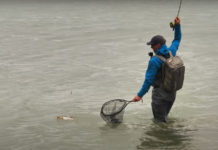PEOSTA, Iowa (AP) — Sam Willett is living his dream while sharing his passions with others.
“I’ve always wanted to take people hunting and fishing,” he said. “Since the early 1980s, it was a dream of mine.”
Willett, 61, of Peosta, Iowa, operates a guide business called Walleye to Whitetails.
“This is my fourth season,” he told the Dubuque Telegraph Herald. “It’s an enjoyable time out.”
Willett is semi-retired, with more than 40 years of experience fishing for pleasure and in tournaments. He specializes in walleye fishing in an area of the Mississippi River extending from Guttenberg, Iowa, south to Bellevue, Iowa. Willett directs hunters seeking guide services to a landowner with 200 acres who can host hunters for deer and turkey hunting.
“Going toward retirement, I wanted to do something,” he said.
That’s when he decided to follow his long-term dream to become a fishing guide. He obtained a Coast Guard captain’s license that enables him to take up to six people onto the Mississippi, where he offers half-day or full-day fishing trips based out of Midtown Marina in East Dubuque, Ill.
Denni Backstrom and her family have gone on trips with Willett during trips to Dubuque from their home in the Eau Claire, Wis., area.
“I actually found Sam on Facebook and reached out to him,” Backstrom said. “He replied quickly and seemed to know how to get us some great fishing experience while we were in town.”
The Backstroms plan to hire Willett again in April.
“This will be our fourth or fifth trip,” Backstrom said. “Sam is patient and friendly. We have learned so much from him, and our (13-year-old son Cole) counts the days to fish with him. He and Sam have quite a good time talking about fishing, what’s biting and how to catch the best fish on the Mississippi. Sam knows the river and knows where to get some great fish. We always go home with great fish for dinner and even better memories.”
Along with clients from the Upper Midwest, Willett has attracted customers from as far away as Texas, Maryland and Colorado.
“A lot of people just want to get out on the river,” he said. “They tell me about their part of the country, and they just think it’s really beautiful around here. A lot of people don’t even want to take their fish home. They just want to get out and get in some fishing on the river.”
Willett’s season coincides with ice-free periods on the river, generally from March to November.
“Whether they catch fish or not, they’re going to learn the areas where the fish are,” he said. “I show them techniques and (equipment) for different kinds of fishing and what I look for when I’m fishing. I’m mostly after walleyes, but we also catch plenty of catfish and bass.”
Willett said among the surprises he encountered when launching his business was the amount of preparation and cleanup work it required.
“For a five-hour trip, I start about an hour-and-half before,” he said. “It becomes almost an eight-to-10-hour day. For an eight-hour trip, it becomes a 10- or 12-hour day. But that’s just part of the job, and it’s something I enjoy doing.”
Area fishing guides also ply their trades on local streams.
Jim Romberg, owner of Fly Fisherman’s Lair guide service in Fennimore, Wis., began taking people fishing on an informal basis in 1977 as a side endeavor to field research he performed in Minnesota.
“After I took a couple of people out, I bought a Wisconsin guide license, and I’ve been doing trout (trips) ever since,” said Romberg, 68.
Romberg moved to Grant County 30 years ago and has taken more than 2,000 clients on trout-fishing trips in southwest Wisconsin.
“Every day is different, and no two clients are ever the same,” Romberg said.
As a guide, Romberg said he’s a combination of instructor and entomologist.
“You have to know where the fish are and how to catch them and you pass that on to folks,” he said.
Romberg’s season depends on weather conditions.
“I don’t like to go out unless it’s 38 degrees and above,” he said. “(Trout) are slow and lethargic this time of the year.”
Warmer temperatures provide a better fishing experience for Romberg’s clients and are better for the health of the fish.
“And it’s all about the fish in this business,” Romberg said.
Clients’ fishing abilities are “all across the spectrum,” according to Romberg.
“You have folks who have fished in this area, and you have folks who have no equipment and no idea how to fish,” he said. “You have to teach some people how to cast and you have to think about where you can take them where their ability will actually catch some fish. You have to be patient with people.”
Sometimes, Romberg’s clients are experienced trout fishermen from outside the area who come to learn about the best areas to fish.
“A lot of my clients come out of the Chicago area,” he said. “I make reservations for them at local motels, and then I can show them some basic areas to fish. We will fish one stream in the morning and fish another in the afternoon. I can set up a day based on what (the clients) would like to experience.”
Credit: Source link






























